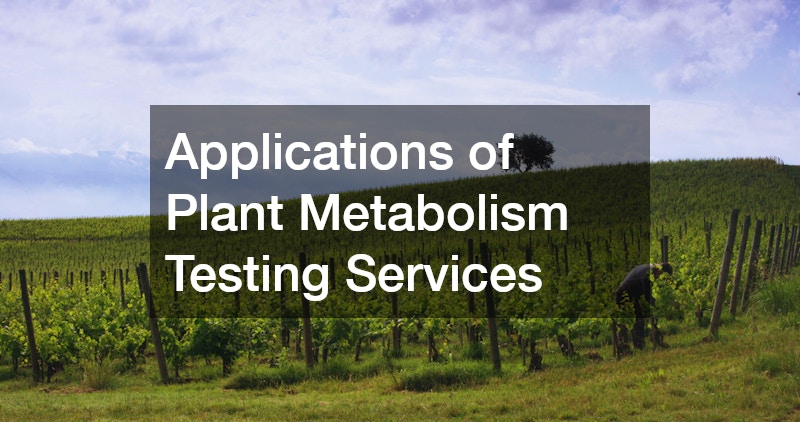In the intricate world of botany, plant metabolism testing services have emerged as pivotal resources for understanding how plants interact with chemicals. These services dive deep into the cellular and molecular processes that drive the transformation of substances within plants, providing critical insights for agricultural, pharmaceutical, and environmental applications. Through these tests, researchers can better comprehend a plant’s ability to absorb, metabolize, and eliminate chemicals, ultimately paving the way for innovative solutions in crop improvement, sustainable farming, and environmental protection.
The Significance of Plant Metabolism
Plant metabolism encompasses the complex set of chemical reactions that occur within plant cells. These biochemical processes not only allow plants to grow but also enable them to interact with their environment in significant ways. Understanding plant metabolism is crucial because it influences how plants process nutrients, resist pests, and survive in challenging conditions. The insights gained from studying plant metabolism can inform the development of crops that are more resilient and resource-efficient. As such, plant metabolism testing services play a vital role in advancing scientific knowledge and fostering agricultural innovation.
Research in plant metabolism has uncovered pathways that allow plants to detoxify harmful substances, a trait that holds promise for phytoremediation. This is the process by which plants are used to remove or neutralize contaminants from soils and water. Furthermore, by exploring these metabolic pathways, scientists can genetically engineer plants to enhance their natural detoxification abilities. Consequently, these testing services contribute to environmental sustainability by offering potential solutions to pollution and soil degradation issues. The study of plant metabolism is therefore not just an academic exercise but a practical endeavor with real-world implications.
The study of plant metabolism also provides critical data necessary for ensuring food security. With the global population constantly rising, there’s an increasing demand for crops that can thrive under various environmental stresses. By understanding how plants metabolize different molecules, researchers can enhance the nutritional content, yield, and stress tolerance of crops. Plant metabolism testing services thus serve as an indispensable tool in crafting the crops of the future, those capable of feeding an ever-growing population while requiring fewer resources and less environmental impact. Constant innovation in this field will likely play a key role in establishing a sustainable agricultural framework.
Advancements in Plant Metabolism Testing Techniques
In recent years, technological advancements have significantly enhanced plant metabolism testing services. Modern techniques such as mass spectrometry and nuclear magnetic resonance (NMR) have allowed scientists to obtain detailed insights into plant metabolic processes at unprecedented resolutions. These technologies enable the accurate detection of metabolic changes within plants, helping researchers identify biochemical pathways and their responses to various stimuli. The precision provided by these methodologies is crucial for developing targeted strategies in agriculture and environmental management. As technologies continue to evolve, they will likely drive further breakthroughs in our understanding of plant biology.
Another notable advancement is the use of high-throughput screening methods in plant metabolism studies. This approach allows for the rapid testing and analysis of numerous plant samples, accelerating the pace of research and innovation. High-throughput techniques are particularly beneficial in studying the effects of a wide variety of compounds on plant metabolism. By characterizing how different chemicals impact plant systems, scientists can identify beneficial and detrimental interactions, paving the way for the development of safer and more effective agricultural products. The integration of advanced technologies into plant metabolism testing services promises to expand the scope and applicability of research findings.
Applications of Plant Metabolism Testing Services
Plant metabolism testing services find numerous applications across various industries. In agriculture, these tests enable the development of crops that are resistant to pests and diseases, thereby reducing the reliance on chemical pesticides. This not only lowers production costs but also minimizes the environmental impact associated with conventional agricultural practices. Furthermore, by optimizing metabolic pathways, researchers can enhance the nutritional value of crops, contributing to better diets and improved public health. As a result, plant metabolism testing services are integral to the progress of sustainable agriculture and the production of healthier food.
In the pharmaceutical industry, plant metabolism testing is crucial for the discovery and development of new drugs. Many pharmaceuticals are derived from plant compounds, and understanding how plants metabolize these substances provides valuable insights into their potential effects on humans. This knowledge can guide the extraction and synthesis processes, ensuring that beneficial properties are retained while harmful effects are minimized. Moreover, studying plant metabolism can reveal novel compounds with therapeutic potential, driving innovation and advancing medical frontiers. Plant metabolism testing services thus play a pivotal role in both drug development and enhancing the understanding of plant-derived compounds.




